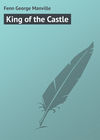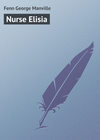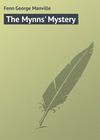Loe raamatut: «The White Virgin», lehekülg 3
Chapter Six.
The Lead of Lead
“Ahoy there! Sturgess! Are you hurt?”
“Hurt, sir? No.”
“Then don’t make that noise, man. Any one would think you were a child, frightened at the dark.”
“But where are you, sir?”
“Down here, of course.”
“I thought you were killed, sir, and – and – ”
“That you were left alone in the dark, man. There, wait till I get a light.”
Michael Sturgess muttered an oath, and leaned forward over the sharp slope, as he wiped the great drops of fear-born perspiration from his face. “Child, am I?” he muttered. “I’ll let him see. Enough to scare anybody – place like this.”
He gazed downward as Reed, after a little manipulation of the damaged lanthorn, struck a light, which gleamed out some sixty feet below. Then the candle was relit, giving the man a faint glimpse of the horrible-looking slope, and lastly Reed began to climb up, slowly talking the while. “Of course it’s an ugly-looking place,” he said; “these underground limestone caverns always are, but it’s of no use to lose your nerve at the first emergency.”
There was a good-humoured contempt in the young engineer’s tones which enraged the big strong man above him as he stood looking down at the light.
“Like to scare him!” he muttered, as Reed climbed higher, rested when about half-way up, and raised the lanthorn above his head to gaze at the rock face before him, as if seeking for a good hand or foot hold.
“I daresay this place goes down for far enough,” he said, as he continued his climb, and kept on talking as if to take his companion’s attention; “it would be interesting to try and plumb the depth.”
“Shall I take the lanthorn?” said Sturgess, a minute or two later.
“No, thanks, I’ll carry it,” replied Reed, as he made his way to where Sturgess stood. “I shall want to look at the walls here and there as we go back. There! might have been worse. A bit scratched, and my clothes a little torn. I will go back to the regular old workings now. There has evidently never been anything done here.”
“No, sir; what I told you. No good here.”
“No good!” said Reed, with a laugh. “I think there’s a great deal of good.”
“What, workable stuff, sir?” said the man sharply. “Perhaps; but what I meant was this tremendous hole and the water. Why, Sturgess, man, it’s worth thousands.”
“Don’t see it, sir,” said the man roughly.
“I do. A natural drainage of the mine. No expenditure for keeping the workings dry.”
“Oh, yes, that’s right enough, sir,” said the man, with a laugh, “if you’ve got anything to work.”
“I’m afraid Mr Sturgess and I will not get on together,” said Reed to himself, as he led the way on, examining the wall from time to time, and now and then chipping off a piece for a specimen.
“If this cockney jockey’s going to be over me,” muttered Sturgess, “he’s got to be tough; but he don’t know everything.”
They reached the entrance to the grotto-like portion of the mine, where Reed halted, took out a sandwich-box and flask, and began to refresh himself, handing both to his companion first; and as Reed ate, he lifted the lanthorn from time to time, and examined the neighbouring walls, roof, and floor.
“All pretty well cleared out, sir,” said Sturgess, with a grin.
“Yes – clean,” replied Reed quietly; and soon after they resumed their exploration, following the track of the old veins here and there through an almost interminable maze of passages, and going farther and farther into the depths of the mountain. But it was always the same, passage after passage through the limestone, following the old lode of lead ore which had been diligently quarried and picked out any time during, probably, the past two thousand years, and there was no plan, no special arrangement in driving the various tunnels. Where nature had run her mineral in veins, there the old miners had followed; and, as Reed had noticed before, there was scarcely a passage that had water lying about, the drippings from the roof and cracks in the walls having worn for themselves little channels, which found their way into others, and then by degrees went to swell the fall by whose side he had stood some hours before.
At last, with his bag growing heavy with specimens, and the supply of candles getting less, and after the termination of the workings had been found and examined in several places, Reed stopped.
“Back now,” he said.
“Satisfied, sir?”
“Oh yes, for to-day. I shall follow the other leads, of course, till I have well examined all, and mapped it out.”
“And settled where you shall begin work, sir,” said the man, with a grin.
“Oh, I have settled that,” replied Reed.
Sturgess stared.
“Been a lot of good stuff got out of here, sir, no doubt.”
“Evidently.”
“More than there ever will be again.”
“That’s more than we can say, Sturgess. Take the lanthorn now, and lead on straight for the mouth. Good heavens! Why, it’s five o’clock.”
“Yes, sir, I thought it must be,” said the man.
“Time goes when one is interested. There, have a cigar. Light up. We have not done a bad’s day work. Can you lead back pretty straight?”
“Oh yes, sir, I can manage that,” said the man confidently; but he had been trudging along, sending his and the young man’s shadows grotesquely dancing upon the roof for quite an hour and a half before the end of the main artery of the mine was reached, with the sloping shaft up to the daylight – “to grass,” Sturgess termed it – but here there was no response to their hails for nearly an hour, the men having gone.
“The scoundrels!” Reed cried at last. “Well, it’s risky work, but we can’t stop down here. We must either go back into the mine, try for the other shaft, which may be climbable, or you or I must go up that rope.”
“Who’s to climb a rope like that, sir?” growled Sturgess; “and how do we know that the end’s properly fastened? – There they are!”
For a faint murmur of voices was heard from far above, and now an answer came to their hail, and a minute later a voice shouted —
“All right below?”
“Yes,” cried Reed. “Get in the loop, my man. – Ahoy there! haul up.”
The rope tightened and Sturgess was raised from his feet and went up slowly, leaving Reed below in the darkness.
But it was all light to the young engineer, whose tired face shone with joy and excitement.
“The blind cavern lizards,” he said, half aloud. “I knew it. God bless the old dad, what a brain he has! He’ll be delighted with my report; and Janet, my darling, you shall have a home that will be the envy of all we know, and make the old Doctor proud of us. My darling!” he said softly, as, with his eyes half closed, he raised up her fair young face before him. “Hah! poor old Jessop, too. He must have a bit of the luck. I’ll tell the old man bygones must be bygones. We’ll have a clean slate. Jess isn’t a bad fellow after all. I might have gone down the wrong road a bit if it hadn’t been for Janet. Hang it all! the love of a dear sweet girl does keep a weak fellow straight.”
He glanced down at his hands and tweed suit, daubed with limestone mud, and showing a couple of tears in the stout cloth.
“Delightful party for a drawing-room, and – hullo! here’s the loop.”
He secured the rope, which came dangling down, felt that his specimens and tools were safe, and then slipped the loop over his head, sat in it as nonchalantly as if it had been a swing, uttered a loud “All right,” and the next minute he was being steadily hauled up towards the surface.
Chapter Seven.
Making Friends
“Hallo, my lads!” cried Reed, as he reached terra firma and gazed around. “I didn’t know there was a public-house handy.”
“No, no, don’t blame the poor lads,” said a well-dressed, elderly man, smiling. “They were alarmed at your long absence, sir, and came on to me for help. We came round, and picked up these two brave fellows, and were ready for a search, but, thank heaven, it was a false alarm.”
“Oh, that was it?” cried Reed; “then I beg your pardon, my lads, and thank you, sir, heartily. Whom have I the pleasure of addressing?”
“Major Gurdon, at your service, sir,” and there was a swift military drawing up of the spare figure, the soft dark eyes brightened up, and the speaker threw back his grey head and gave his long white beard a shake to settle it upon his breast.
“Mr Reed, I believe, the new engineer of the mine?”
“Yes, sir, but at this present moment more like one of the miners,” said Reed, with a deprecating glance at his besmirched garments. “Excuse me one moment.”
He turned to the men with his hand in his pocket – a hand that did not come back empty, and the new-comers went off slowly, smiling as Reed turned now to the Major, who had stepped forward, eager to speak.
“You look thoroughly exhausted,” he said quickly. “I live quite a cottage life out here with my garden and fishing-rod, but if you will accept my hospitality, such as it is – ”
“Really, I could not trouble you – and in this condition,” began Reed, as Sturgess changed colour, and an unpleasant scowl came upon his face.
“You will be conferring a favour, my dear sir,” said the Major. “One does not often have the society of a gentleman out in this wild place; and,” he added laughingly, “the hospitality will embrace soap and water and a clothes-brush.”
“Then I accept willingly,” said Reed, holding out his hand, but withdrawing it directly as he noted its condition, covered with dried limestone mud, and streaked in two places with blood.
“Nonsense!” said the Major, taking the hand. “I understand these things, my dear sir. I often go prowling about with a geologist’s hammer, and have gone home like this. Come along. My high tea will be about ready.”
“Well, this is most unexpected,” said Reed warmly. “Here, Sturgess, I shall come over again to-morrow about eleven. Be here with the men, and you had better bring a couple of lanthorns.”
“Hadn’t I better come on to put you in the right road?”
“What! Oh, no! I shall manage. That will do.” The man turned away with the look upon his countenance intensifying; but it was not observed, for Reed walked off in company with his new acquaintance, the pair chatting away as if they had known each other for years.
“Quite gave me a scare,” said the Major. “Life here is so uneventful. Very beautiful, but lonely, especially in the winter.”
“But you do not stay here in the winter?”
“Oh yes; I have lived here ten years now.”
“No accounting for taste,” thought Reed; and he glanced sidewise at his companion, but learned nothing. He only saw a quiet-looking country gentleman, whose sun-browned face told of an open-air life.
Sturgess followed them to the great natural gateway at the end of the chasm, where he had stood some days before, but not alone; and he now remained watching them as they went on westward along the narrow path, and round by the huge buttress formed by the refuse of the mine, carried and cast down there for hundreds upon hundreds of years. Then as they passed on out of sight, the man raised one of his fingers to his lips, and began gnawing roughly at the side of the nail, till he seemed to make up his mind, and took a step or two forward after them, next stopped short again, for a hail came from behind.
“Coming on down to the village, Mr Sturgess?”
He turned and faced one of the two men, and nodded, walking away with him in the other direction, taciturn and strange, answering his companion in monosyllables, and with his thoughts evidently far away. Not so very, though, for they were with Clive Reed, and promised him no good.
“So you have been examining the old ‘White Virgin’ mine, eh?” said Major Gurdon. “I heard it was sold. A new company, eh?”
“Yes,” said Reed, smiling; “a new company – a solid one.”
“Eh? I hope so. But if I had to go in for a mining adventure, I think I should begin here with the material the old miners cast away as rubbish.” He pointed to the great buttress they were skirting. “There it is, already extracted from the mountain, and though poor, rich enough, I should say, to pay a company if worked with modern appliances.”
“You understand these things?” said Reed, looking at his elderly companion searchingly, and noting how deeply lined his brow seemed, and that care and sorrow more than age had given him his hollow-cheeked, anxious air.
“A man who likes geology, mineralogy, and who always lives among these hills, cannot help picking up a little mining lore,” said the Major, with a smile. “I have searched and toiled, my dear sir – much loss and little gain. I hope yours may prove to be a successful venture.”
“Let’s hope so,” said Reed quietly. “All mining is speculative, and in speculative matters there must be losses as well as gains.”
“And after all, what does it amount to, my young friend? The chase of a will o’ the wisp who bears a golden lamp not worth the winning, you will say when you grow as old as I. But there, I shall bore you with this twaddle. What do you say to that for a view? Derbyshire in front; broad, honest, hardworking old Yorkshire away to your right; at your feet the Swirl – my river, I call it.”
“A lovely prospect, but rather wild,” said Reed, smiling.
“Say savage, and you will be nearer the truth; but I can show you something a little less stern;” and, chatting away pleasantly, he led on along first one slope and then another, till at last they came down upon a narrow track beside a rippling stream, shut in between two perpendicular walls of rock, draped with ivy, and with every cleft and crevice green and bright with trailing birch, moss, and clustering fern.
The water of the little river ran swiftly babbling here among the rocks, there swirling round, eddying and forming whirlpools, one of which, across the river where it washed the perpendicular rock, was evidently very deep, for the water gradually subsided there and grew still and glassy, reflecting the ivy-curtained walls as it slowly glided round.
“Ah! this is delightful,” cried Reed, as he stopped to gaze at the glancing waters, where the sun made the ripples dazzling to the eye, and then turned to the deep shadows. “Eden may have been lovely, but this would be good enough for a poor commonplace nineteenth-century fellow like myself.”
“You like it?” said the Major, smiling.
“It’s glorious. Is there much of it like this?”
“About a mile. I call it my river here, and the mining men respect my rights generally – that is, unless the trout they catch sight of in some pool is a very fat one indeed.”
He said this with a peculiar smile, as he met Reed’s eye.
“Not bad fellows, the miners, but I don’t quite take to your guardian of the mine.”
“I suppose not,” said Reed. “He is rather a rough customer, but he was recommended to my father for his knowledge of underground work. – You have plenty of trout here, I suppose?”
“Oh yes, and I take toll of them all along this stretch of river. Possession is nine points of the law, but I really have only my right on one side as far as my bit of property extends.”
“Ah! you have an estate along here?”
“Yes, and I am glad to meet my neighbours, sir. My rough piece of mountain is bounded by the river along here from the corner we just passed, and on another side by the mine land of your Company – the old ‘White Virgin’ estate. A worthless stretch of barren rock and ravine; but I bought it for the sake of this piece of river fifteen years ago. A place to retire to, my dear sir, suitable for a man weary of the world, and one of whom the world had had enough.”
His face was overcast as he spoke, and he frowned heavily, while Reed noticed the sad, careworn aspect of the man, who looked as if he had suffered from some terrible trouble – that which had so deeply lined his face. But it brightened up again directly, as Reed hung back to admire the lovely meandering stream.
“You do like it?” said the Major.
“Like it, my dear sir! If I were not a busy man, bound to go on carving my way, it is just the place where I should like to come and dream away my days.”
“Do you care for fishing?”
“Oh yes.”
“Then, as we are neighbours, if you come much to the mine, I shall at any time be glad to show you a few good places where you can throw a fly.”
“Some day I shall certainly ask you,” said Reed frankly; “not often, I have no time.”
“Whenever you like, and you will be welcome, Mr Reed; for – excuse me – I like you.”
“So soon,” said Reed, raising his eyebrows.
“The liking of one man for another comes at once, sir, I think, and seldom errs,” said the Major gravely. “You will be welcome if you can content yourself with cottage fare and our simplicity. This is my little home.”
Reed stopped short astonished, for they had turned a sharp corner of the rugged wall of rock which towered up, and came suddenly upon a sheltered nook, which ran from the river-side right up into the mountains. There was but one level space of about half an acre; the rest was knoll, crag, mound, and rift, a natural garden full of waving birch, shrubs, evergreens, and flowers all growing in wild luxuriance, with myrtle, fuchsia, hydrangea, and geranium, developing into trees more than plants, showing how sheltered the place must be, how warm and suited to their lives. There was no ugly fence, but moss and ivy covered walls of rugged stone, placed here and there as a protection from wandering sheep, while on the level patch, quaintly built of limestone, thatched, porched with rugged wood, its windows embayed, and the whole covered with wistaria, myrtle, and creeping plants, which fought for a hold upon the walls, stood a cottage, out of whose porch Dinah Gurdon, pale of face, anxious-looking, and troubled, came slowly down.
“Welcome to the wilderness, Mr Reed,” said the Major, smiling sadly, as he noted the young man’s enthusiastic look of admiration; and then frowning slightly as he saw a wondering look when the figure in white came toward them from the porch. “My daughter, sir. Dinah, my child, I bring a guest to partake of our poor hospitality this evening. Don’t look so pale and frightened, my dear. Mr Reed is, I am glad to say, a deceiver. There was no cause for alarm, and his aspect is only due to a long journey underground. He is not hurt.”
“I – I am very glad,” said Dinah, holding out her hand, which was eagerly taken, and then shrinking as she encountered Clive Reed’s eager look. “The men brought such startling news.”
“That we were prepared to turn your bedroom into a cottage hospital, Mr Reed, and send off twelve miles for a doctor,” said the Major, as he saw his child’s large dark eyes sink beneath their visitor’s gaze, and a couple of red spots begin to glow in her pale cheeks. “Now, Dinah, my child, Mr Reed must be shown to his room, and let’s have your colour back. My daughter is a little unwell, Mr Reed. She was crossing the mountain the other day, coming back from Bedale, and as she passed over one of the ragged pieces by your mine, she had an ugly fall.”
“Not serious, I hope?” said Reed, with a look of interest, and his searching eyes once more met those of the pale, intense countenance before them, eyes so full of shrinking horror and fear, that though he could not read them, Clive Reed wondered at their expression, as a flow of crimson suffused the cheeks, rising right up to the forehead, and then died out, leaving the girl deadly pale.
The Major waited, as if expecting that his child would speak, but as she remained silent, he said gravely —
“No; she assures me that it was not serious, but she came back looking horribly startled. It was quite a shock to the system, from which she has not quite recovered yet. Now, Mr Reed, Martha will show you your room.”
Reed took a step forward, to find Martha, the hardest-looking, harshest-faced woman of forty he had ever seen, waiting to lead the way.
“A fall,” he said, as he stood alone in the prettily furnished bedroom: “alone in the mountains, and no one by to help. I wish I had been there – with Janet, too, of course.”
Dinah Gurdon was at that moment indulging in similar thoughts – naturally omitting Janet – and as she stood nearly opposite a glass, she became aware of her face reflected there, when she turned away with a shiver.




















